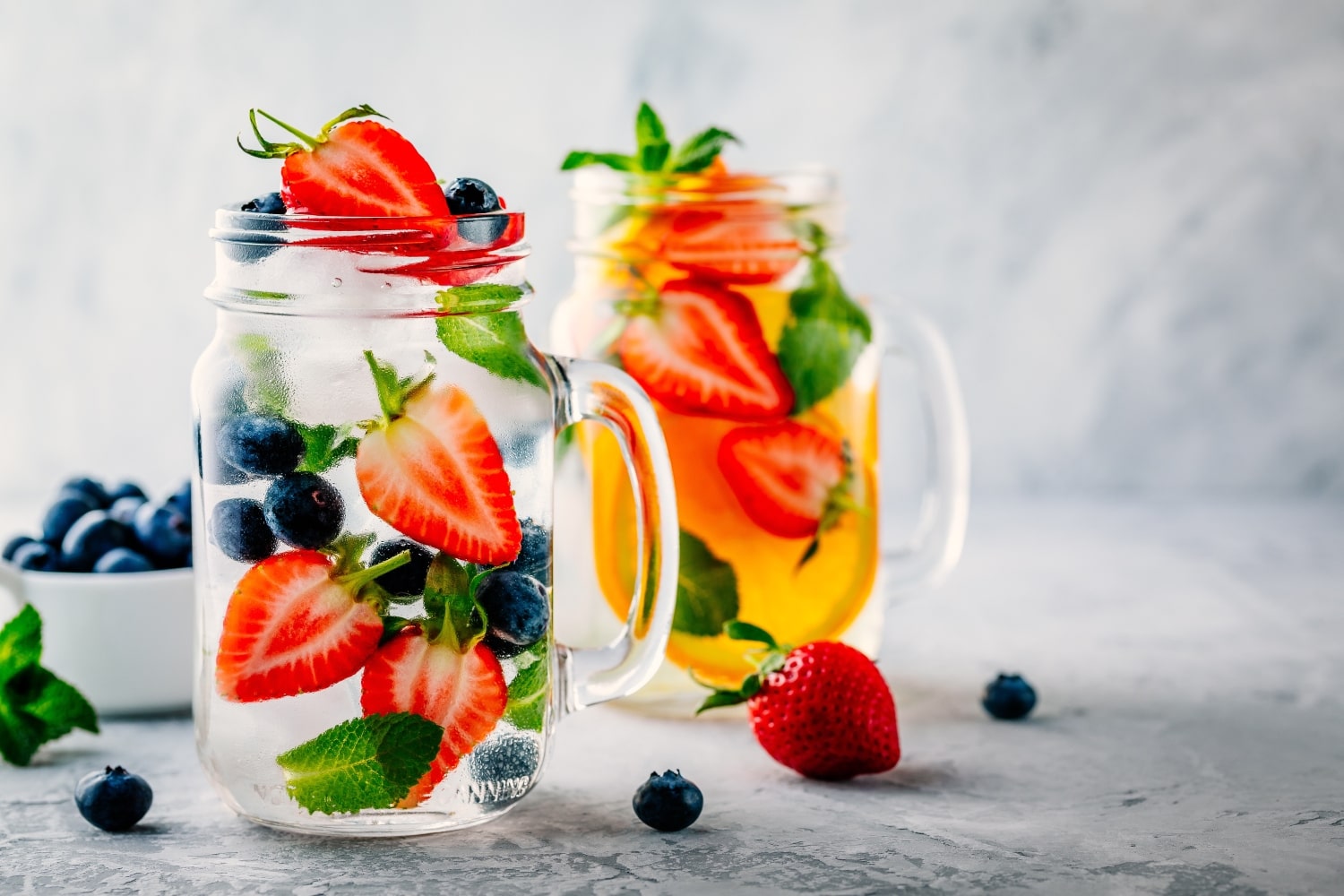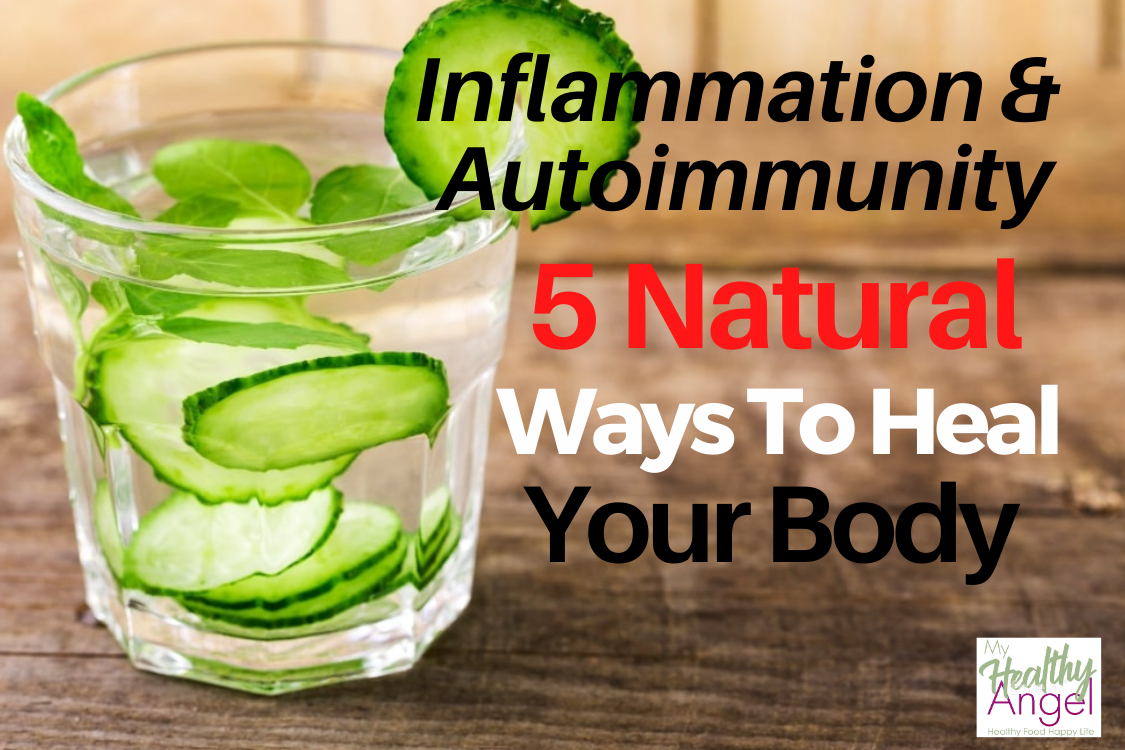Today’s post is inspired by the friends and family that have asked me what I do to stay healthy amidst autoimmunity. One of the main reasons I wanted to start this blog was to create a conversational platform for all things health. So, here’s what I’ve learned about natural ways to decrease inflammation and autoimmunity.
What are Inflammation and Autoimmunity?
Inflammation is your body’s response to things that could harm it. The problem is when your body is chronically in an inflamed state of alert. Studies have shown chronic inflammation may be the underlying cause of illnesses like heart disease, autoimmunity, rheumatoid arthritis, type 2 diabetes, asthma, cancer, and more.
I’ve had an autoimmune illness for over 20 years. There have been some ups and down with finding natural ways to reduce inflammation and autoimmune disease symptoms. Unfortunately, there’s no quick fix (darn!). But you can make huge health gains by paying attention to how your body responds to natural solutions.
5 Natural Ways To Help Your Body Heal Itself
Here are my top 5 proven ways to help your body heal itself. They are the order I started using them. You might find, one has a stronger impact than it might have 5 years ago. We’re changing, all the time!
1. Hydration
Drinking tons of clean water was the first step I took towards helping my body fight inflammation. It was easy to do and easy to understand the water hydrates and marinates the joints and flushes out toxins. Your body is 60 percent water and your brain is 75%. Your organs need water every day to function well.
You store water in your muscles and connective tissues. Your body looks for water in other areas when you get dehydrated, including joints, and redistributes as needed. Try getting that sore knee to feel better when you’re not properly hydrated – fat chance of that happening!
And, Hydration goes hand in hand with decreasing inflammation. Water repairs cells damaged during inflammation (e.g. a hard workout, exposure to toxins).

2. Exercise
Think about how you sometimes feel stiff in the morning before you start moving. Do you feel looser after a good workout? You don’t seem to feel them as much when you’re working out because, when you exercise, you produce an anti-inflammatory cell response.
*As with anything you’re reading here, check with your regular primary doctor before making any changes.
Exercise decreases inflammation by:
- Producing endorphins and endothelial nitric oxide which is anti-inflammatory compounds
- Improving circulation which helps oxygenate and deliver nutrition to tissue and remove toxins
- Producing chemicals in the brain that improve brain function (brain neurotrophic factor)
3. Sleep
Sleep is your body’s time to heal and repair. Getting enough quality sleep at the right time is as important as food and water. You can’t form or maintain the pathways that help you learn and create new memories without good sleep. You’ve also probably noticed you’re a bit slow and can’t concentrate as well when you don’t sleep well.
Sleep affects every system from your brain to heart, lungs, metabolism, immune system, and ability to resist disease. In fact, studies show chronic lack of sleep leads to high blood pressure, cardiovascular disease, decreased immune function, diabetes, depression, obesity, and more.

4. Plant-Based Nutrition
The first book I got my hands on to learn more about the connection of inflammation to autoimmunity was The Inflammation Syndrome by Jack Challem. The second book was The Inflammation Spectrum by Dr. Will Cole. Both authors share similar thoughts on four ways a plant-based diet can help reduce inflammation and autoimmune illness.
a) Plant-based Diets are Associated with Lower Levels of CRP (C-Reactive Protein)
CRP is an inflammatory marker. Elevated levels of CRP — a marker for inflammation — are associated with a higher risk of a heart attack. Diets higher in fat, animal products, and processed foods were found to have higher inflammatory markers in bloodwork. A study showed that after 8 weeks, CRP levels were 32% lower in the vegan group than the group that followed the AHA diet. The AHA diet includes lean fish, chicken, meat, and poultry along with plant-based foods.
b) Plant-Based Reduce Pain and Joint Swelling with RA (Rheumatoid Arthritis)
A study showed after four weeks on a plant-based diet, autoimmunity was reduced in RA. The low-fat, high-fiber plant-based diet lowered overall pain and inflammation.
c) Vegan or Plant-Based Diets are Associated with Lower BMI (Body Mass Index)
Multiple studies have shown that plant-based diets are effective in reducing body weight. A lower BMI in turn is associated with a reduced risk of multiple diseases. Obesity itself is a state of chronic inflammation.
d) Plant-Based Diets Increase Healthy Gut Bacteria
Last but not least, and my favorite – plant-based studies have been shown to increase healthy gut bacteria. And, multiple studies have shown a healthy microbiome plays a key role in inflammation and autoimmunity.

My two cents: Going plant-based had the single biggest impact on my health than anything else. However, I was already hydrating, exercising, and eating clean.
Meditation/Spiritual Practice
This goes hand in with reducing stress and cortisol. So much of “reducing stress” is wrapped up in HOW you reduce stress. All five of these are healthy ways to reduce stress.
I end my workouts with 5-10 minutes of meditation and/or devotional practice. The main reason is to take my body from a sympathetic nervous system response to parasympathetic nervous system response.

What does this mean?
Your sympathetic nervous system controls your body’s “fight or flight” response. The other part, your parasympathetic nervous system works to relax and slow down the body’s response. Research has shown if you are chronically in the “fight and flight” mode, it takes a toll, physically and psychologically.
Have you ever felt like you just cannot breathe? It’s probably a good time to take some deep breaths to activate your parasympathetic nervous system.
Cortisol and Cytokines
Studies have also shown meditation works to decrease inflammation and thereby autoimmunity. Your body responds to stress by producing Cortisol (the stress hormone). Cortisol fires up your immune system to respond to any potential health threat by creating cytokines (cells that attack disease). Cytokines are inflammatory.
This takes us back to the sympathetic nervous system and the “fight or flight” response. It’s good when we need it (like running away from a bear or any other inherent danger). But, if you’re always in a state of stress, your immune system (and other parts of the body) go into overdrive – leading to chronic inflammation.
As a classic Type A personality where I am running at high octane the minute I get out of bed, this practice of “cooling down” my brain, has had one of the biggest impacts on my health.
Taking Back Your Health
Taking back your health can be a scary thing. It can become a habit to be chronically stressed. And it can be an ego thing to be chronically busy. It totally was for me. I finally took a step down from a high-profile job when my health broke down.
It was the best decision of my life. Five years later, with no health issues, I’ve written a book and have a full-time job in the wellness space among people I love. Plus, I have this incredible blog space to talk about my favorite subjects – health, wellness, nutrition, and more.
So, there’s no perfect way to better health, there’s only your way. Every step you take towards better health is the right step.
Peace!


